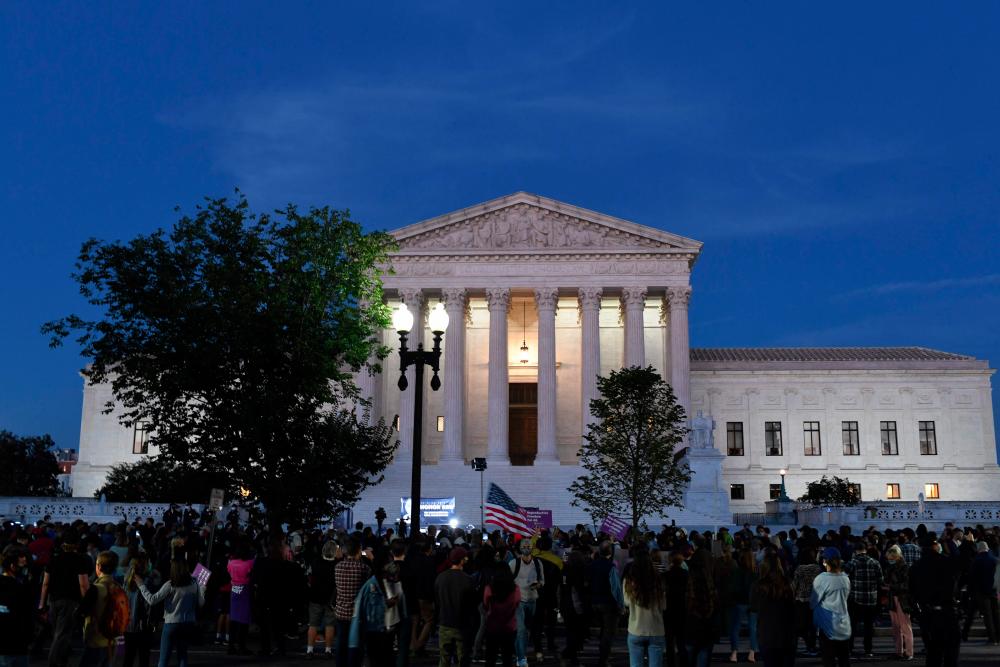WASHINGTON: U.S President Donald Trump vowed Saturday to quickly nominate a successor, likely a woman, to replace late Supreme Court Justice Ruth Bader Ginsburg, only a day after the death of the liberal stalwart.
The president’s desire “to move quickly” on the process despite Democrats’ vehement opposition, is likely to dominate the campaigns — alongside other hot-button issues like the coronavirus and America’s ongoing racial reckoning — ahead of the November 3 presidential election.
“I think it’s going to move quickly actually,“ Trump told reporters outside the White House Saturday, adding that he thought his choice would be made “next week.”
The 87-year-old Ginsburg, immensely popular among Democrats, died Friday after a long battle with cancer, prompting an outpouring of national grief.
She was one of only three women on the nine-person bench, and Trump indicated Saturday he would aim for a female replacement, telling reporters his pick “most likely would be a woman.”
Ginsburg’s death, coming just weeks before the election, offers Republicans a chance to lock in a decades-long conservative majority on the court, where justices are appointed for life.
The stakes are high as the decision could affect such life-and-death issues as abortion, healthcare, gun control and gay rights.
They are pushed even higher in a bitter election year when the justices can play a decisive role in legal wrangling over a contested result — such as when they ruled in George W. Bush’s favor to end the 2000 election debacle.
Trump has already named two justices during his first term as president, Brett Kavanaugh and Neil Gorsuch, giving conservatives a 5-4 majority before Ginsburg’s death, though that does not guarantee rulings in Trump’s favor — there have been several recent examples of conservatives siding with their progressive colleagues to tilt the balance.
Trump, who is lagging in the polls behind Biden, has another powerful incentive to move ahead: providing a jolt of enthusiasm among his anti-abortion and evangelical supporters.
But, with 45 days to go before the election and some early voting already begun in some states, Democrats are pushing back furiously.
Biden said Friday that “the voters should pick the president and the president should pick the justice for the Senate to consider.”
The prospect of a fierce partisan nomination battle and rushed Senate confirmation vote has ignited his party, still seething over Republicans preventing Barack Obama from filling a court vacancy through most of the 2016 election year.
‘Nothing is off the table’
While Democrats’ options seem limited, Senate minority leader Chuck Schumer told party members Saturday that if Republicans press ahead then “nothing is off the table,“ according to media reports.
“This vacancy should not be filled until we have a new president,“ Schumer said Friday, carefully echoing the words of Senate Republican leader Mitch McConnell in 2016 when he blocked Obama nominee Merrick Garland.
Republicans in theory have the Senate votes to push through a Trump nominee, but they could be blocked by only a handful of defections.
Analysts predicted Democrats would do their best to drag out the process while fanning public outrage over what Democrats called the Republicans’ hypocrisy.
“Their option is to build a groundswell... to try to convince at least four Republican senators to vote ‘no’ on whoever the president puts forward,“ Amy Howe, co-founder of a Supreme Court blog, said on CNN.
A confirmation vote of Trump’s eventual nominee before November 3 would be unusually quick. The average period from nomination to confirmation is around 70 days.
Republican doubters
Republican Senator Susan Collins became the first to break ranks with her party when she announced Saturday she would not support a vote on any Trump nominee before the election.
“The decision on a lifetime appointment to the Supreme Court should be made by the president who is elected on November 3,“ she said in a statement.
The Maine lawmaker is among a handful of moderate Republican senators — including Lisa Murkowski of Alaska — who have already expressed doubts about a rushed vote.
“I totally disagree with her” Trump said of Collins’ stance, referencing his 2016 election in adding that “we have an obligation as the winners to pick who we want.”
One prominent Democratic member of the Senate Judiciary Committee, which will oversee the confirmation hearings, is none other than Senator Kamala Harris, Biden’s running mate, who commanded the spotlight 2018 with her aggressive questioning of Trump court nominee Kavanaugh.
On Saturday, Harris and her husband visited the Supreme Court building to join hundreds of mourners, many of them women, to pay homage to Ginsburg.
“RBG was one of my pioneers, an icon, a fighter,“ Harris told AFP. “She was a woman in every way.”
Court reform?
Trump has already named scores of conservatives as federal judges, and Democrats fear a deep and lasting shift in balance at the Supreme Court.
“If he’s allowed to put more conservatives in, this is going to be disastrous for the next 40 to 50 years,“ said Gloria Browne-Marshall, a civil rights attorney, on CNN.
Some Democrats have mused that if Biden is elected and Democrats control both houses of Congress, they might expand the court from nine seats to 11 — allowing the new president to appoint two more liberal justices. — AFP















